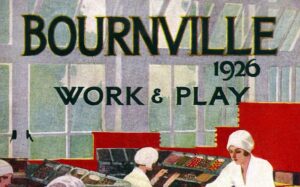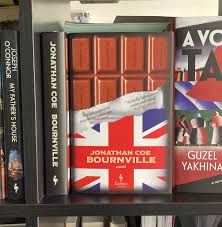‘Must read’ book: Bournville – Jonathan Coe

British novelists love to diagnose the state of the nation. Few do it better than Jonathan Coe, who writes with warmth and subversive glee about social change and the comforting mundanities it imperils. Bournville, his 14th novel, may lack the caustic verve of What a Carve Up! (1994) or the wistful charm of The Rotters’ Club (2001), but it’s an affectionate work of social history in fictional form, tracking four generations of a West Midlands family whose dreams, successes, misadventures and divisions reflect the shifting contours of postwar Britain
 It’s largely set in a model village on the south-west side of Birmingham. Created by the Cadbury family of Quaker industrialists in the 1890s, Bournville was designed to house workers from their chocolate factory and ‘alleviate the evils of modern, more cramped living conditions’. Coe grew up five miles away, and one of the main characters, Mary, is based on his mother. Garrulous and resourceful, she has three sons: timid musician Peter, doomed forever to repeat the rhythms of childhood; perennially wary Martin, whose job with Cadbury plunges him into European politics; and breezy Jack, a football-mad pragmatist who likes asserting his suspicion of all things German
It’s largely set in a model village on the south-west side of Birmingham. Created by the Cadbury family of Quaker industrialists in the 1890s, Bournville was designed to house workers from their chocolate factory and ‘alleviate the evils of modern, more cramped living conditions’. Coe grew up five miles away, and one of the main characters, Mary, is based on his mother. Garrulous and resourceful, she has three sons: timid musician Peter, doomed forever to repeat the rhythms of childhood; perennially wary Martin, whose job with Cadbury plunges him into European politics; and breezy Jack, a football-mad pragmatist who likes asserting his suspicion of all things German
Coe dwells on seven key events. Each is seen obliquely, and each provides an opportunity, laced with irony, to sample the country’s mood. On VE Day, Winston Churchill speaks of ‘this ancient island’ drawing the sword against tyranny, and his phrasing rings down the years. The televised coronation of Queen Elizabeth II prompts one character to muse that this still newish broadcasting medium will surely prove a force for good. The 1966 World Cup Final, rather than being a moment of sublime unity, exposes different seams of national feeling, as does the wedding of Charles and Diana, which promises to sell an attractive and smartly orchestrated image of Britain, yet is fraught with nervousness
Other developments highlight the nation’s unease about its brand. Any suggestion of decline meets with a blast of triumphalism, but this is tinged with self-doubt or queasy nostalgia. When the Birmingham-built Austin Mini Metro is launched in 1980, advertisements show the little cars forming a platoon on the white cliffs of Dover. Prospective buyers learn that ‘Now we have the means to fight back’ and ‘This could be your finest hour’. As Martin remarks to an enraptured Jack: ‘It’s a bit much, isn’t it?’
In another cchapter, an enjoyable segue from the mid-1990s, the adult Martin — now a senior employee at Cadbury — witnesses the so-called “Chocolate wars”, in which his beloved confectionery is dismissed as not conforming to European standards; these passages also offer a first sighting of an unscrupulous journalist called Boris. By the end of the novel, he is, of course, the UK’s prime minister
 Class, social mobility, politics, multiculturalism, nationalism, sexuality, family, community — the changing face of Birmingham, of work, of Britain and its seemingly inevitable path to Brexit is documented by Coe without sensation or sentiment. He briskly addresses difficult issues — such as the unspoken racism towards a non-white member of the Lamb family, or the later life coming out as gay of another family member. Mary is their matriarch, and Coe has been open about basing her on his own mother, who died during the worst period of the pandemic. The most affecting and despairing parts of Bournville are given to her final days, and the lovely coda that concludes the book, with its image of the circularity of time, does not diminish Coe’s – or the readers’ – loss
Class, social mobility, politics, multiculturalism, nationalism, sexuality, family, community — the changing face of Birmingham, of work, of Britain and its seemingly inevitable path to Brexit is documented by Coe without sensation or sentiment. He briskly addresses difficult issues — such as the unspoken racism towards a non-white member of the Lamb family, or the later life coming out as gay of another family member. Mary is their matriarch, and Coe has been open about basing her on his own mother, who died during the worst period of the pandemic. The most affecting and despairing parts of Bournville are given to her final days, and the lovely coda that concludes the book, with its image of the circularity of time, does not diminish Coe’s – or the readers’ – loss
As Bournville draws closer to the present, it grows angrier. Coe is plainly dismayed by the erosion of community and the opportunism of politicians. But he is too self-aware to harangue the reader. His pleasant sense of the absurd never recedes from view, and for all the novel’s satirical tang and historical sweep, at its root, it’s a tender portrait of apparently simple folk trying to fathom the mystery of their own personalities
Leave a reply
You must be logged in to post a comment.







